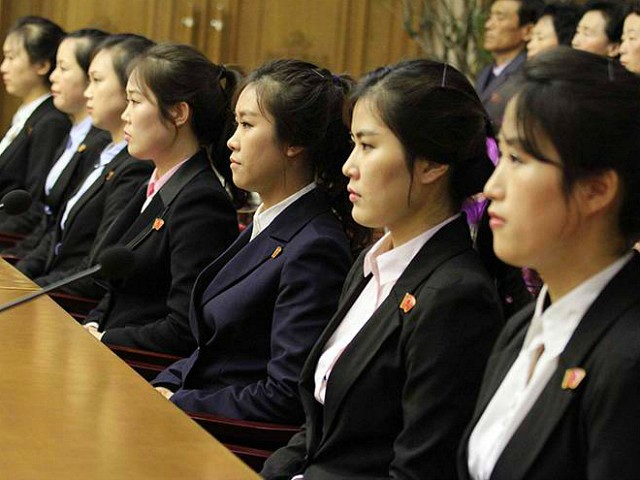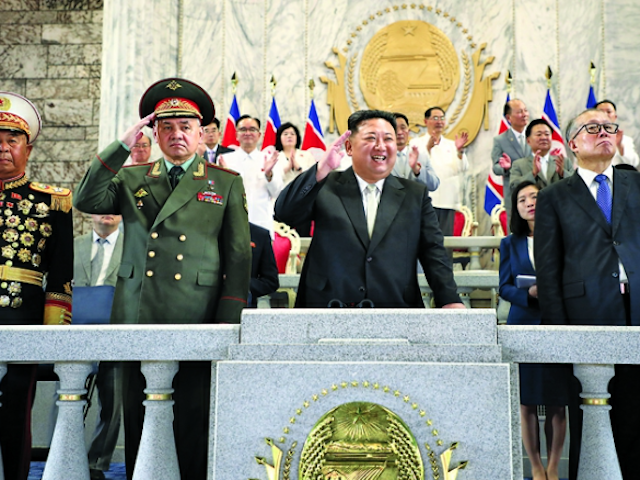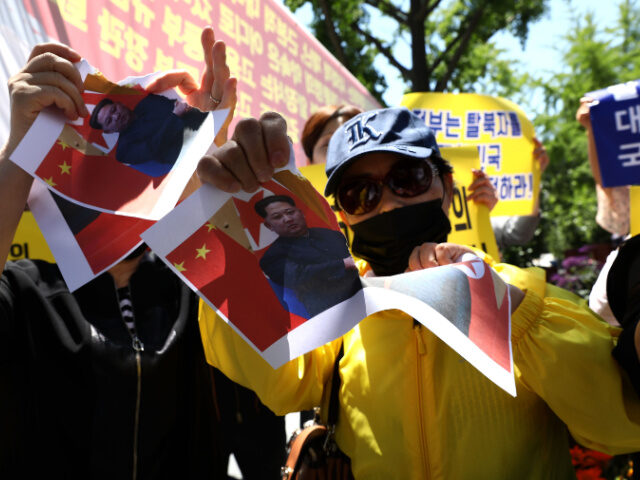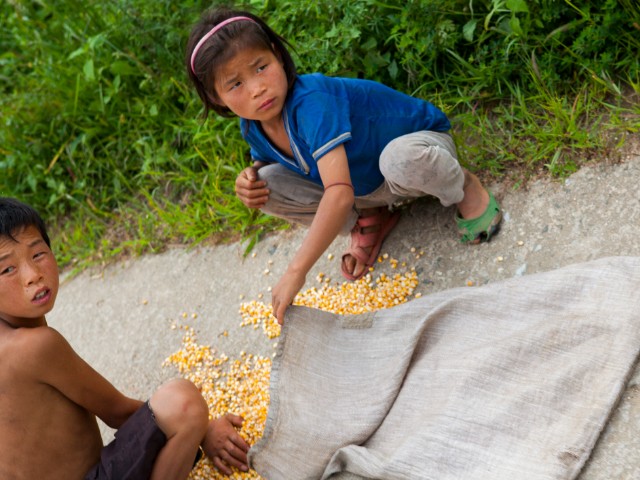The government of communist North Korea announced on Sunday that its citizens currently located outside of the country would be allowed back in for the first time since the onset of the Wuhan coronavirus pandemic.
North Korea sends a large number of citizens around the world to promote and fund the communist Kim family cult running the country, from diplomats at the United Nations to restaurant workers in allied nations such as China and Russia, often working in destitute conditions. North Koreans outside of the country who are not allied with the government are almost entirely defectors, many of whom faced harrowing journeys across China to reach South Korea and settle there or abroad. China traditionally returned defectors to North Korea, forcing them to face brutal sentences of years of work in labor camps, but North Korea stopped accepting them back in 2020.

Colleagues of 12 North Korean waitresses are presented to the media in Pyongyang, North Korea, Tuesday, May 3, 2016. North Korea is stepping up its calls for South Korea to return 12 waitresses it says were tricked into going to the South. Seoul says the waitresses willingly defected (AP Photo/Kim Kwang Hyon).
Pyongyang’s decision to let citizens back into their own country indicates that dictator Kim Jong-un no longer considers the Wuhan coronavirus pandemic a major threat to the population and represents the end of one of the last remaining pandemic-era restrictions. The restrictions began falling suddenly in the last few months; North Korean state media published images of people not wearing sanitary masks for the first time since the pandemic in July.
“The State Emergency Epidemic Prevention Headquarters (SEEPH) issued the following announcement on Aug. 26: DPRK citizens abroad have been allowed to return home,” the state-run Korean Central News Agency (KCNA) announced on Sunday in a brief message. “Those returned will be put under proper medical observation at quarantine wards for a week.”
South Korean news agency Yonhap reported on Monday that repatriations began almost immediately.
“Around 300 to 400 North Koreans left Dandong in northeastern China earlier in the day for the North’s border city of Sinuiju by bus,” Yonhap reported, citing unnamed sources. “It marked the first time for North Koreans to return home by road transportation since the two countries closed their borders in January 2020 due to the COVID-19 pandemic.”
North Korea began accepting noncitizen travelers from Russia and China last week, the South Korean newspaper Korea JoongAng Daily noted on Sunday. Air Koryo, the North Korean national airline, reportedly resumed flights connecting Pyongyang to Beijing and Vladivostok, a far-east Russian city, late last week. The newspaper noted that the airline had not published the schedule for the flight to Vladivostok before it landed on Friday, following the arrival of the Air Koryo flight to Beijing.
Those flights, in turn, followed visits to North Korea by two high-ranking officials from both governments in late July. Russian Defense Minister Sergei Shoigu became the first foreign government official, outside of diplomats stationed at embassies, to enter North Korea in late July, followed shortly thereafter by senior Chinese Politburo member Li Hongzhong. Kim Jong-un offered the two seats flanking either side of him for a massive parade to mark the 70th anniversary of the armistice agreement that ended active hostilities in the Korean War.

North Korea holds parade to mark 70th anniversary of Korean War armistice (“Victory Day”), July 27, 2023. (Rodong Sinmun/government of North Korea)
South Korea’s Unification Ministry, which addresses North Korea-related issues, suggested on Monday that the sudden change in policy was likely a result of the economic devastation that the restrictions had caused the country. North Korea is under one of the world’s most onerous sanctions regimes – a response to its constant, violent repression of citizens and regular threats to use nuclear weapons against its neighbors and America – relying on rogue regimes such as China to violate the sanctions and fuel commerce.
“Due to its border closure, North Korea is presumed to have faced various economic difficulties, and there were probably many inconveniences as personnel exchanges were blocked,” Unification Ministry spokesperson Koo Byoung-sam said. Koo described the reopening as currently “limited” and said the Ministry had “grave concerns” that Pyongyang would soon once again be accepting defectors caught in China, who would likely be subject to extreme torture and other human rights abuses in prison.
“We’d like to stress once again that such defectors should not be forcibly sent back to the North against their will. Their own will should be respected,” Koo asserted.
North Korea first shut off “all air and train routes” to China in February 2020 in response to the reports of an infectious disease hospitalizing potentially thousands in Wuhan, central China, that year. Reports also surfaced at the time that the North Korean government had asked China to stop sending its defecting citizens back home.
By September, General Robert B. Abrams, commander of U.S. Forces Korea (USFK), said that Pyongyang had stationed soldiers on the border with China, along the Yalu River, and issued orders to kill anyone trying to cross.
“When the border shut down with COVID-19, it’s dropped imports from China by 85 percent. So there is a cumulative effect economically of COVID with the sanctions and, of course, North Korea smugglers been trying to get across and, as a result, you know, the regime issued out instructions,” Abrams said. “So now they have gotten an additional buffer zone, one to two kilometers up on the Chinese border.”
“They’ve got North Korean SOF [special operation forces] manning these things, strike forces, they’ve got shoot-to-kill orders in place, and this is fundamentally about preventing COVID from getting into North Korea,” Abrams said.
The effects of restrictions on travel, particularly for smugglers, on the North Korean population are believed to have been severe, causing significant shortages of food, medicine, and other basic needs. In a rare display, Kim Jong-un issued a speech in October apologizing to his people while crying, though he did not specify exactly for what.

In this image made from video broadcasted by North Korea’s KRT, North Korean leader Kim Jong Un delivers a speech during a ceremony to celebrate the 75th anniversary of the country’s ruling party in Pyongyang Saturday, Oct. 10, 2020 (KRT via AP).
“Although I am entrusted with the important responsibility to lead this country upholding the cause of the great Comrades Kim Il Sung and Kim Jong Il thanks to the trust of all the people, my efforts and sincerity have not been sufficient enough to rid our people of the difficulties in their life,” Kim said, according to state media. “I solemnly swear once again in this place that I will live up to the people’s trust without fail even if my body is torn and crushed to pieces on the way of defending their great trust and that I will remain faithful to that trust.”
A year later, the situation appeared not to have improved much. According to sources within the country speaking to Radio Free Asia (RFA), in October 2021, North Korean officials began telling civilians that Kim was unlikely to open the border with China before 2025, so they should cope with the consequences by eating less.
“Authorities emphasized that the possibility of reopening customs between North Korea and China before 2025 was very slim,” one unnamed North Korean said. “The food situation right now is already clearly an emergency, and the people are struggling with shortages. When the authorities tell them that they need to conserve and consume less food until 2025 … they can do nothing but feel great despair.”


COMMENTS
Please let us know if you're having issues with commenting.